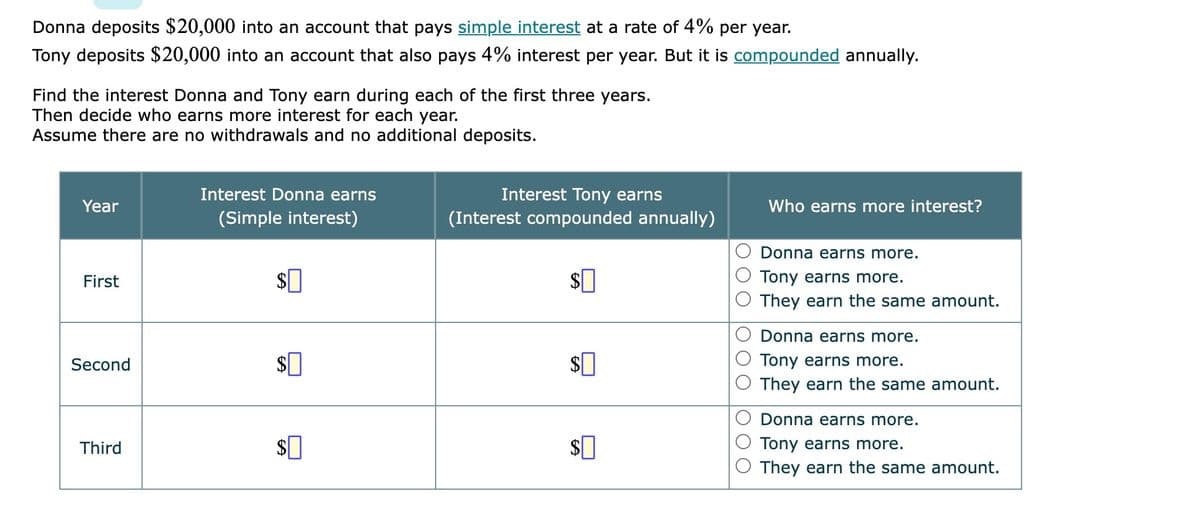Donna deposits $20,000 into an account that pays simple interest at a rate of 4% per year. Tony deposits $20,000 into an account that also pays 4% interest per year. But it is compounded annually. Find the interest Donna and Tony earn during each of the first three years. Then decide who earns more interest for each year. Assume there are no withdrawals and no additional deposits. Year First Second Third Interest Donna earns (Simple interest) $0 $0 Interest Tony earns (Interest compounded annually) $0 $0 Who earns more interest? O Donna earns more. O Tony earns more. O They earn the same amount. O Donna earns more. O Tony earns more. O They earn the same amount. O Donna earns more. O Tony earns more. O They earn the same amount.
Donna deposits $20,000 into an account that pays simple interest at a rate of 4% per year. Tony deposits $20,000 into an account that also pays 4% interest per year. But it is compounded annually. Find the interest Donna and Tony earn during each of the first three years. Then decide who earns more interest for each year. Assume there are no withdrawals and no additional deposits. Year First Second Third Interest Donna earns (Simple interest) $0 $0 Interest Tony earns (Interest compounded annually) $0 $0 Who earns more interest? O Donna earns more. O Tony earns more. O They earn the same amount. O Donna earns more. O Tony earns more. O They earn the same amount. O Donna earns more. O Tony earns more. O They earn the same amount.
Chapter5: Introduction To Business Expenses
Section: Chapter Questions
Problem 61P
Related questions
Question

Transcribed Image Text:Donna deposits $20,000 into an account that pays simple interest at a rate of 4% per year.
Tony deposits $20,000 into an account that also pays 4% interest per year. But it is compounded annually.
Find the interest Donna and Tony earn during each of the first three years.
Then decide who earns more interest for each year.
Assume there are no withdrawals and no additional deposits.
Year
First
Second
Third
Interest Donna earns
(Simple interest)
$
$
$
Interest Tony earns
(Interest compounded annually)
$0
$
$0
Who earns more interest?
Donna earns more.
Tony earns more.
They earn the same amount.
Donna earns more.
Tony earns more.
They earn the same amount.
Donna earns more.
Tony earns more.
They earn the same amount.
Expert Solution
This question has been solved!
Explore an expertly crafted, step-by-step solution for a thorough understanding of key concepts.
This is a popular solution!
Trending now
This is a popular solution!
Step by step
Solved in 3 steps

Knowledge Booster
Learn more about
Need a deep-dive on the concept behind this application? Look no further. Learn more about this topic, finance and related others by exploring similar questions and additional content below.Recommended textbooks for you


Excel Applications for Accounting Principles
Accounting
ISBN:
9781111581565
Author:
Gaylord N. Smith
Publisher:
Cengage Learning



Excel Applications for Accounting Principles
Accounting
ISBN:
9781111581565
Author:
Gaylord N. Smith
Publisher:
Cengage Learning


Cornerstones of Cost Management (Cornerstones Ser…
Accounting
ISBN:
9781305970663
Author:
Don R. Hansen, Maryanne M. Mowen
Publisher:
Cengage Learning

EBK CONTEMPORARY FINANCIAL MANAGEMENT
Finance
ISBN:
9781337514835
Author:
MOYER
Publisher:
CENGAGE LEARNING - CONSIGNMENT

Intermediate Accounting: Reporting And Analysis
Accounting
ISBN:
9781337788281
Author:
James M. Wahlen, Jefferson P. Jones, Donald Pagach
Publisher:
Cengage Learning